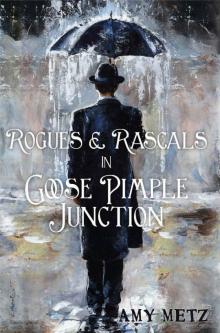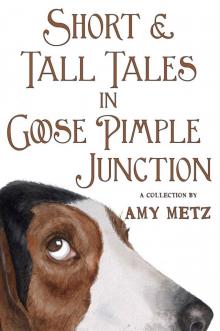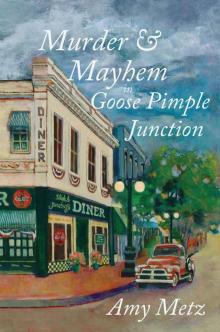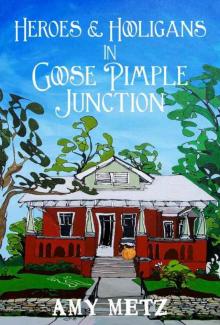Murder & Mayhem in Goose Pimple Junction Read online
Page 20
She drove to work, since it made her feel less vulnerable and also because she was exhausted. She pulled into a parking spot several spaces down from the bookstore and noticed Jack waiting out front.
“I just got your message.” He rushed to meet her at the car. “Are you all right? What happened? Who called? You sounded a little tense.”
She sighed. “Yeah, I’m a lot tense. Someone called last night after you all left and said I was, ‘sticking my nose where it didn’t belong,’ or something like that. He . . . she . . . it . . . whoever it was said I should butt out or I’d be sorry. And then they hung up.”
An alarmed look came over Jack’s face as he listened to Tess. “Did it sound like a man or a woman?”
“Yes. No. I mean, I don’t know. It was impossible to tell. It was kind of a raspy whisper. Jack, you’re just as involved in this as I am. Why wouldn’t they call both of us?” She studied Jack’s face and added, “Or did they?”
“No. My guess is the person figured you could be scared off more than me. I don’t think they know you very well.” He gave her a reassuring smile. “Aw, Tess.” He pulled her into a hug and then stepped back. “I hate that you’re going through all of this. Why don’t we just forget about it? It’s not worth you getting hurt or terrorized over. Lou doesn’t care, so why should we? Or why don’t you let me do some digging for a while? Let’s keep you out of it.”
“I don’t want to forget about it. I don’t like the feeling that someone is watching me, but the fact that they’re getting bolder says volumes. Somebody thinks I’m going to find out something; I want to know why they care. Besides Jack, you know if we don't get to the bottom of this, I'll never be able to stop looking over my shoulder, or sleep with both eyes shut at night again, as long as I live here.”
“But Tess, this person is getting more menacing. I’m afraid for you. Please think about letting this go.”
“Maybe . . . but there’s one more person I want to talk to before we do. Are you free this afternoon? Can I pick you up when I’m done here?”
“Yeah, I have a feeling about your maybes. Are you going to tell me who it is you want to talk to?” He followed her toward the bookstore.
She smiled. “Not yet. Are you in or not?”
He let out a frustrated sigh. “Woman, you drive me crazy on so many levels . . . but . . . okay. Come and get me when you’re done here.” They stopped at Stafford’s door. “But don’t you dare go anywhere without me, you hear?” You want me to hang around the bookstore today?”
“Thank you, Jack. But I don’t think that’s necessary.”
Lou was in the back room accepting boxes from a UPS delivery when Tess went into the store. She put her purse away, called to Lou, “I’m here,” and got out to the register desk just as the phone rang.
“Stafford’s, can I help you?”
Silence. But Tess could tell someone was there.
“Hello?” she said, apprehensively.
She heard a click and then the dial tone.
* * *
A few hours later, Tess was tired of talking. People had been in and out all morning, but they hadn’t come in for books. Most of them wanted to hear all about the mugging. She’d told the story so many times she thought she could recite it in her sleep. And then Willy came in.
“Hey, Doll!”
“Willy—hello. How are you?”
“I’m busier than a one-legged man at a butt kickin' contest. I just stopped in to say hey.” Lou came out of her office and scowled at him.
“Okay, Lou, I confess. I didn’t come in to look for no book taday. I came in to see how Tess here’s doin’. I done heard about the alter-cation the other night, and I wanted to check and see if there’s anythin’ I can do.”
“Well that’s mighty nice a you, Willy. But as you can see, our Tessie’s doin’ just fine.” Lou patted Tess on the arm.
“Thanks for stopping by, Willy,” Tess said, trying to scrutinize his facial expression and body language.
“Wull, I don’t like thinkin’ a you in harm’s way. You call on me, ya know, if there’s any way I can hep. You just call out my name, and you know wherever I am, I’ll come runnin’.”
“Winter, spring, summer, or fall?” Tess said, sarcastically.
Willy continued with the lyrics of the James Taylor song, singing off key. “All ya got ta do is call . . . “
“Okay, okay, Willy.” Lou began pushing him toward the door. “That’s enough. Time you get movin’ on and let Tess get back to work. I’d say come back, but then, I’m afraid you would.”
“Aw, Lou, why you got ta treat me that way? I never did anythin’ to you.”
“Willy, I b’lieve you could make a preacher cuss! You go and get a respectable job, and quit hangin’ around here botherin’ my employee, and I’ll consider a change a heart concernin’ you.” Lou practically shoved Willy out onto the sidewalk and shut the door in his face.
She took three steps before the door opened behind her. Willy stuck his neck around it, and with a cold tone of voice said, “I’ll have you know I’m plenty busy with work right now. I’m busy as a funeral home fan in July.”
Lou pointed her finger at him. “That’s luvely. Now—OUT!”
“That Willy,” she said disgustedly, walking back toward Tess. “You can't get rid of him. He's like a booger you can't thump off. When will that boy take a hint? I swan, the only thing that would make him dumber is if he was bigger.”
Two o’clock rolled around, and Tess was on her way out when Pickle reported for work.
“Hey, Pickle,” she said greeting him, while looking at his white shirt with black lettering that said, “Do you know the muffin man?”
She pointed to his shirt and said, “Sure I do. He lives on Drury Lane.”
She left him with a confused look on his face.
Tess pulled into Jack’s driveway and found him, Martha Maye, and Butterbean talking in the yard.
“Miss Tess! Miss Tess! Watch this!” Butterbean took a few running steps and then cartwheeled across the yard. When she came to a stop, she turned around and cartwheeled back, landing right in front of Tess. “D’ja see me? D’ja see me?” She hopped, slightly out of breath, from foot to foot.
“I certainly did, Butterbean. That’s fantastic!”
“Thank you. I’m takin’ gymnastics lessons with Miss Paprika,” she said, proud as punch.
Martha Maye sighed. “I used to could do cartwheels across the lawn. Those were the days. Show us some more, sweetie.”
When Butterbean had cartwheeled off again, she said, “Great day in the mornin’, Tess! Jack was just tellin’ me ‘bout your phone call last night. This is gettin’ too scary for me. Do y’all really think this is all over that stupid key?”
“Is it the key? Is it your grandfather’s murder? I don’t know. What else could it be? But that brings me to something I wanted to ask you, Martha Maye.”
“Whassat?”
“Henry Clay mentioned Brick Lynch had a grandson who lives on his old property. Crate, I think he said. Do you know where his farm is?”
“Ya know, I knew that was Lynch’s old farm, but I didn’t know his grandson lived there now, or even that he had a grandson, for that matter.”
“Mary T . . . “ Jack’s voice held a warning.
“Jackson . . . “ She gave him a look, matching his tone. “I just want to have a chat with the gentleman. That’s all.”
“Tess, Henry Clay said he’s a dangerous sort. Said stay away from him,” Martha Maye said.
“I don’t like it, Tess. Not one little bit.” Jack crossed his arms across his chest.
“One litte bit, one tee-nincey bit, or one great big bit. It doesn’t matter. I’m going to talk to the man, and you can either come with me or not.”
Jack acknowledged his cooperation with a big sigh. Then he did a double take. “Did you just say tee-nincey?”
“She’s been hangin’ round my mother for too long,” Martha Maye laughed
.
Tess made a shooing motion at Jack. “The farm, Martha Maye?”
“Here’s what do. Go out past Mack Knob Road until ya get to Route 67. Take a right, and his place is out there a right far piece, oh . . . maybe ten miles or so. Ya cain’t miss it. It’s got a mailbox painted like a confederate flag. But y’all be careful.”
* * *
Crate Marshall lived in a one hundred-year-old farmhouse that had seen better days. It was a weathered white two-story, clapboard-sided house, on about five acres of farmland. It had a winged-gable-roof in the center, with a covered front porch that looked ready to fall in at any moment, and two chimneys on either side of the house. There wasn’t much green anywhere to be seen on the property, except for some scraggly trees and bushes here and there. Two rusty cars, one up on blocks, sat to the right side of the house, and a chicken coop with about a dozen chickens was on the left, with a few loose in the yard. A hand-painted sign saying, ‘no trespassing—that means you,’ was hammered into the dirt about halfway up the dirt and gravel driveway.
Tess pulled up almost to the house and parked. She looked at Jack.
“You sure you wanna do this?” he asked.
She nodded, and they got out of the car. They were halfway between the car and the house when two Rottweilers came barreling toward them from a dilapidated red barn behind the house. The ferocious bark announced their eminent arrival as well as their displeasure with guests.
Just Cut Your Shamer Off and Feed It To The Chickens
zat: pronoun zat is that
Zat right?
GOOSE PIMPLE JUNCTION GAZETTE,
Thursday, April 6, 1939
A case against the New York Life Insurance Company, originally filed in Mallard circuit court by Mrs. Maye D. Hobb, of Goose Pimple Junction, Tennessee, was transferred last week for trial during the May term of Eastern district court at Helechewa.
A lawsuit stemming from a $10,000 death claim, in which the insurance company is named defendant, claims that John Hobb was shot and killed by an unknown person on December 15, 1935. Mrs. Hobb asks for $10,000 double indemnity benefits under a $5,000 life policy held by her husband at the time of his death.
In an answer to the petition, filed by the insurance company through Attorneys Crane and Shore, of Nashville, liability under the policy is denied by allegations that the cause of Hobb’s death was suicide.
[ July 2010 ]
Tess froze when she saw two huge dogs bounding toward them. Then she screamed. “JAAAACK!”
“Car, Mary T, CAR!”
Tess turned too fast and her right foot bobbled on her sandal. Only I could fall off a one-inch heel. She wobbled and then righted herself, and the heavy purse fell off her shoulder. Jack came up behind her, grabbing her purse and her arm. “Come on, Grace.” He pushed her into the car. She scrambled over the console and into the passenger seat, and he followed, practically sitting on top of her so he could close the door tightly.
With both of them safely in the car, the dogs stood barking ferociously just a foot away, as Tess and Jack cowered inside.
The front door opened, and a huge man stepped out onto the porch, pushing mirrored sunglasses over his eyes. He had a confederate flag do rag on his head, and a cigarette poking out of his lips underneath a pencil-thin mustache. A grey wife beater shirt revealed tattoos on each bulging bicep, and his torn denim jeans were tucked into black biker boots. He stood with his hands on his hips and a menacing look on his face.
“Good gravy, he could be the Mr. July for a biker dude calendar.” Tess stared, slack-jawed and wide-eyed.
The dogs continued their protective stance and enthusiastic greeting.
The man took the cigarette from his lips and hollered, “Cain’t you folks read? Sign says no trespassin’.” He paused for a beat, then added, “That means you.”
Tess opened the car window two inches, and called out, “Are you Crate Marshall?”
“Folks call me Tank.” He took a deep drag of his cigarette. “State your bidness.”
“My name’s Tess Tremaine, and this is Jackson Wright. We’d like to talk to you for a few minutes about your family history, if that’s all right.”
“What fer?” he called out guardedly, over the barking dogs.
Jack opened his car door and stood with it as a shield. The dogs moved forward slightly, but kept their distance, emitting a low growl. “I’m writing a book on some events in Goose Pimple Junction’s history. I’d like to talk to you about your grandfather; hear his side of the story on the bank robbery of ‘32.”
Tank stood on the bottom step of the porch, staring at them for a full minute, smoking his cigarette. He finished it, dropped it to the ground, and stomped it out with his booted foot. Jack turned to get back in the car.
“Foghorn! Leghorn! Freeze!” The dogs stopped growling and sat down, tongues hanging out as they panted.
Tess looked at Jack, not sure what to do. Finally, Tank said, “Well come on, if yer comin’. I ain’t got all day.”
They got out of the car, and slowly walked past the dogs, with Tess saying, “Nice doggies.” The dogs didn’t move an inch. Once Tess and Jack reached the porch, Tank held the door open for them. As they went into the house, he called to the dogs.
“Thaw!” The dogs ran back to the barn.
The inside of Tank’s house was not what Tess expected. The furniture and décor suggested a 1950’s housewife lived there. The sofa was pea green under a plastic couch cover. A worn out, but clean, brown recliner with a doily draped at the top sat between the couch and the fireplace. An antique oak rocking chair, with a cane seat sat opposite the recliner. A framed rose painting hung over the fireplace, and old family pictures decorated the walls. It looked like Tank had literally moved in and not changed a thing. The only signs of his presence in the house were the smell of cigarettes, the haze of smoke hanging in the air, and the gun magazines sitting on a long pine coffee table in front of the couch.
Tess had second thoughts about going in as she looked through the cloud of smoke, which hung thick in the room. Jack pushed gently on the small of her back, and she reluctantly moved forward. She resisted the urge to wave her hand in front of her face to dispel the cigarette smoke.
Tess and Jack sat on the couch, and Tank took the recliner. Now that they were up close, Tess could see the tattoos more clearly. His right arm featured a Goth chick, with long, flowing hair and voluptuous breasts spilling out of a skin-tight leather vest; she was wielding a large sword. The left side displayed a tattoo of, aptly enough, a tank.
“What’s this ‘bout a book?” Tank pulled out another cigarette from the pack.
“I write mystery novels, and I’m interested in writing about the bank robbery, for which I believe your grandfather was pardoned.”
Tank put the cigarette between his lips, and Jack added, “I’m interested in learning more about the death of John Hobb, too.”
Tank lit his cigarette with his Zippo lighter, then snapped the lid shut with the flip of his wrist. “Zat right.” He removed his sunglasses, placed them on the coffee table, and rubbed one eye. “Sounds like you already know a good deal about it.”
“We were wondering if your grandfather ever talked about the robbery or Mr. Hobb’s murder,” Tess explained.
“Huh. Yeah, he talked about the robbery. Felt real bad ‘bout it, matter a fact. He’d get drunk and start moanin' and groanin' ‘bout how he’d brought shame to the family, and so on. And Grandma would always say the same thing ever time. I can hear her now sayin’, ‘Jest cut your shamer off and feed it to the chickens.’”
“Your shamer off?” Tess echoed.
“You ain't from round here, are ya? Basically, she meant that guilt idn’t helpful. What’s done is done and ya have ta move on.”
“What about the money?” Jack asked.
“What about it?”
“What happened to it?”
“He never came out and said as much, but I kinda think he had to use
most of it to grease the governor’s palms. Whatever else was left, he probably spent over at Humdinger’s.”
“Any idea how much his cut was?”
“Negative.”
“Do you know what happened to the other men who were involved in the bank robbery?” Tess asked.
“Yeah, I think Rod Pierce died about five years later. And Junior ended up gettin’ caught for another job he pulled. I think he spent most a his life rottin’ in a cell.”
“What about a fourth man?”
“What about him?”
“Did your grandfather ever talk about a fourth man being involved? John Hobb or someone else?”
“Negative. I wouldn’t know anything about that.”
Jack cleared his throat and asked the sixty-four thousand dollar question. “What about John Hobb’s murder?”
“Sounds like you know more ‘n me.”
“Who do you think killed him? Did your grandfather ever talk about that?”
Tank ran his hand over his stubbly cheeks and wide nose. His eyes grew dark, and he answered, “Can’t hep ya.”
Cautiously, Jack said, “Is that . . . because you don’t want to . . . or because you don’t know?”
“What difference does it make? I ain’t answerin’.”
Jack got his wallet from his back pocket, pulled a hundred dollar bill out, and placed it on the coffee table.
Tank stared at it for a few silent moments. Tess couldn’t tell what he was thinking. His eyes went coldly from the bill to Jack. Jack reached out to take it back, but Tank gave in.
“Shoot. Hold on a damn minute.” He took several drags from his cigarette, then put it out in a bean bag ashtray on a small table to his left. “I heard my granddaddy talk about it once. He was there, but another man did it. I ain’t sayin’ who the other man was. I ain’t no rat. Any other questions?”

 Rogues & Rascals in Goose Pimple Junction (Goose Pimple Junction Mysteries Book 4)
Rogues & Rascals in Goose Pimple Junction (Goose Pimple Junction Mysteries Book 4) Short & Tall Tales in Goose Pimple Junction
Short & Tall Tales in Goose Pimple Junction Murder & Mayhem in Goose Pimple Junction
Murder & Mayhem in Goose Pimple Junction 2 Heroes & Hooligans in Goose Pimple Junction
2 Heroes & Hooligans in Goose Pimple Junction